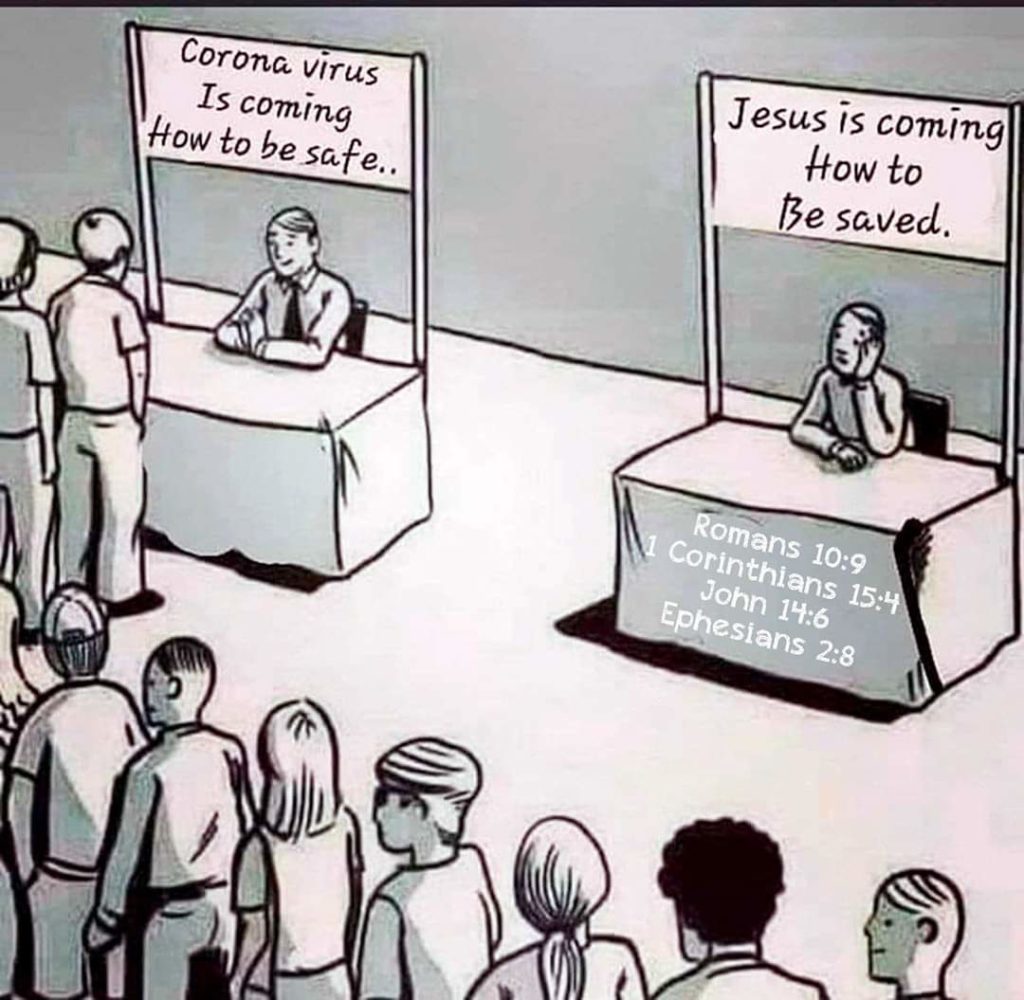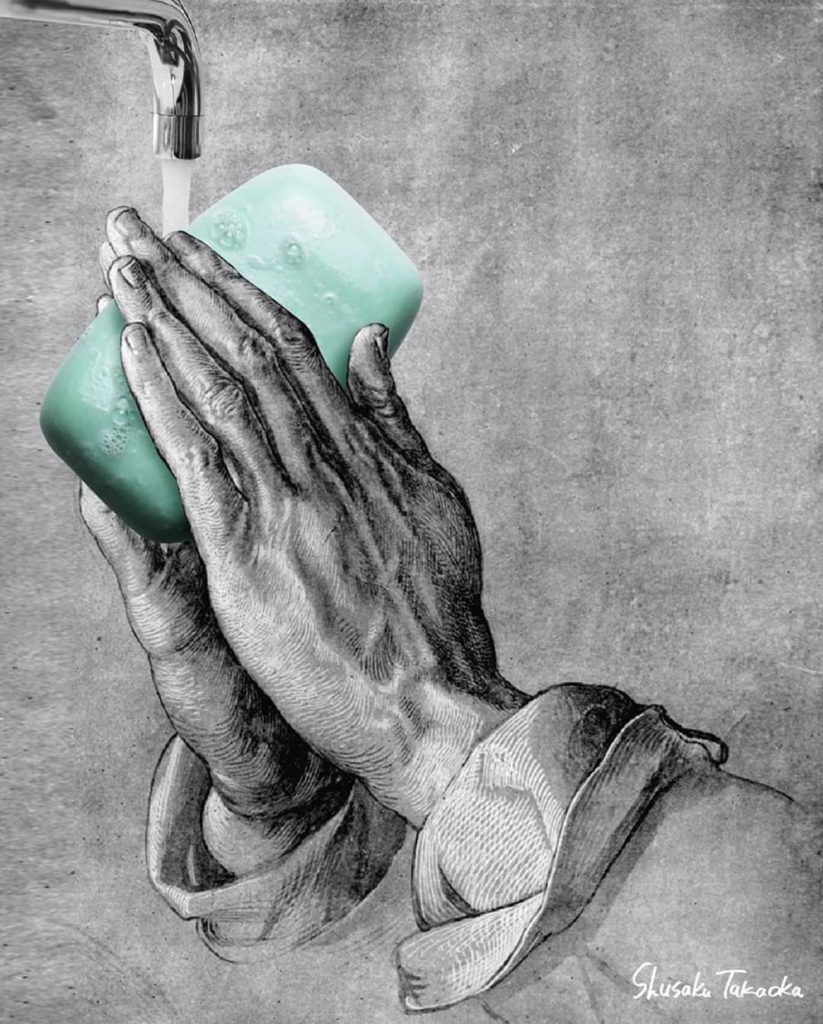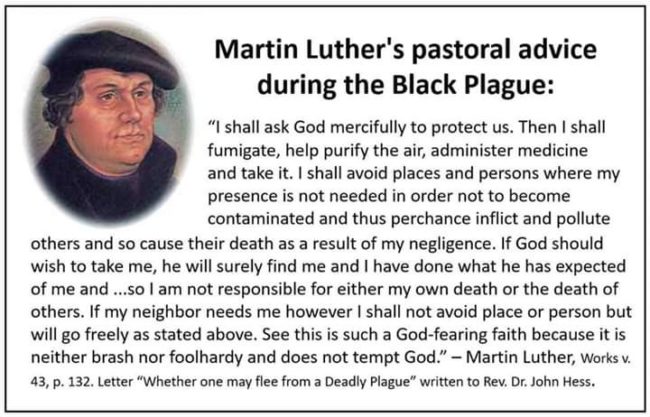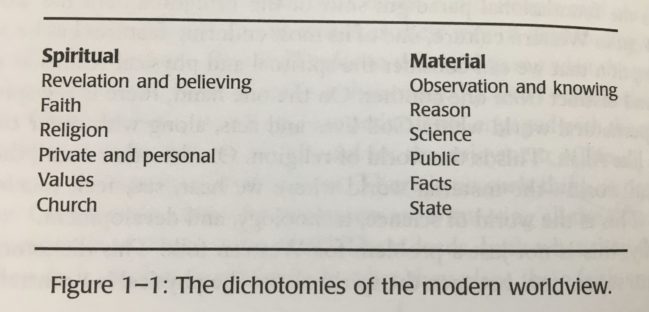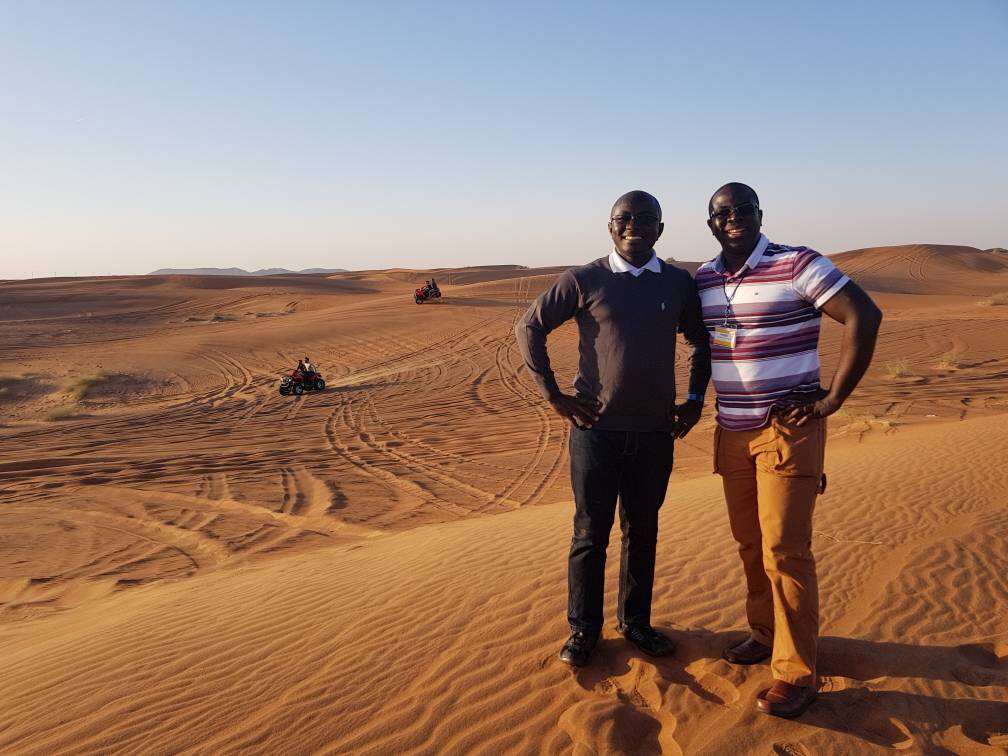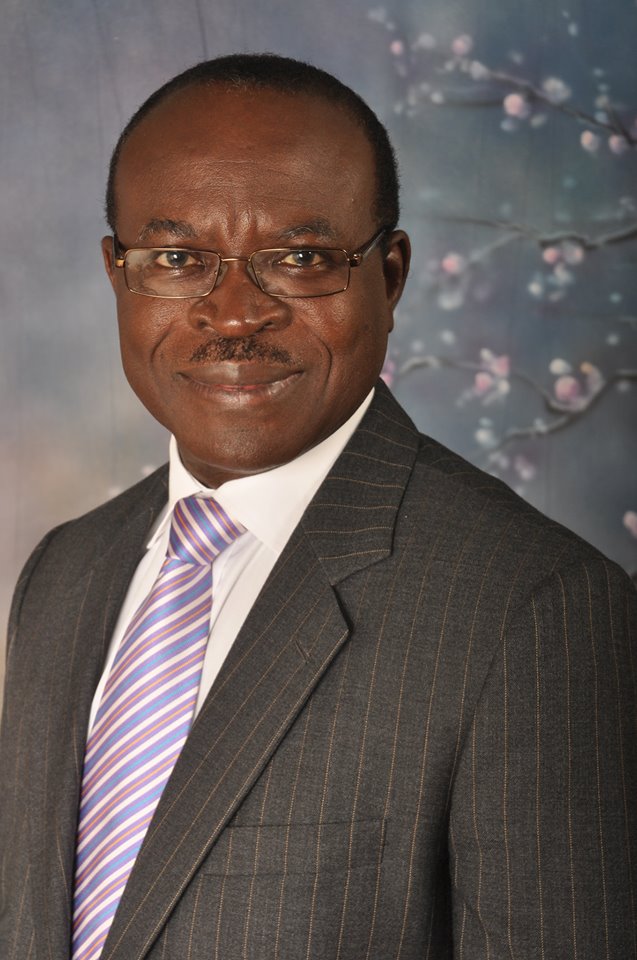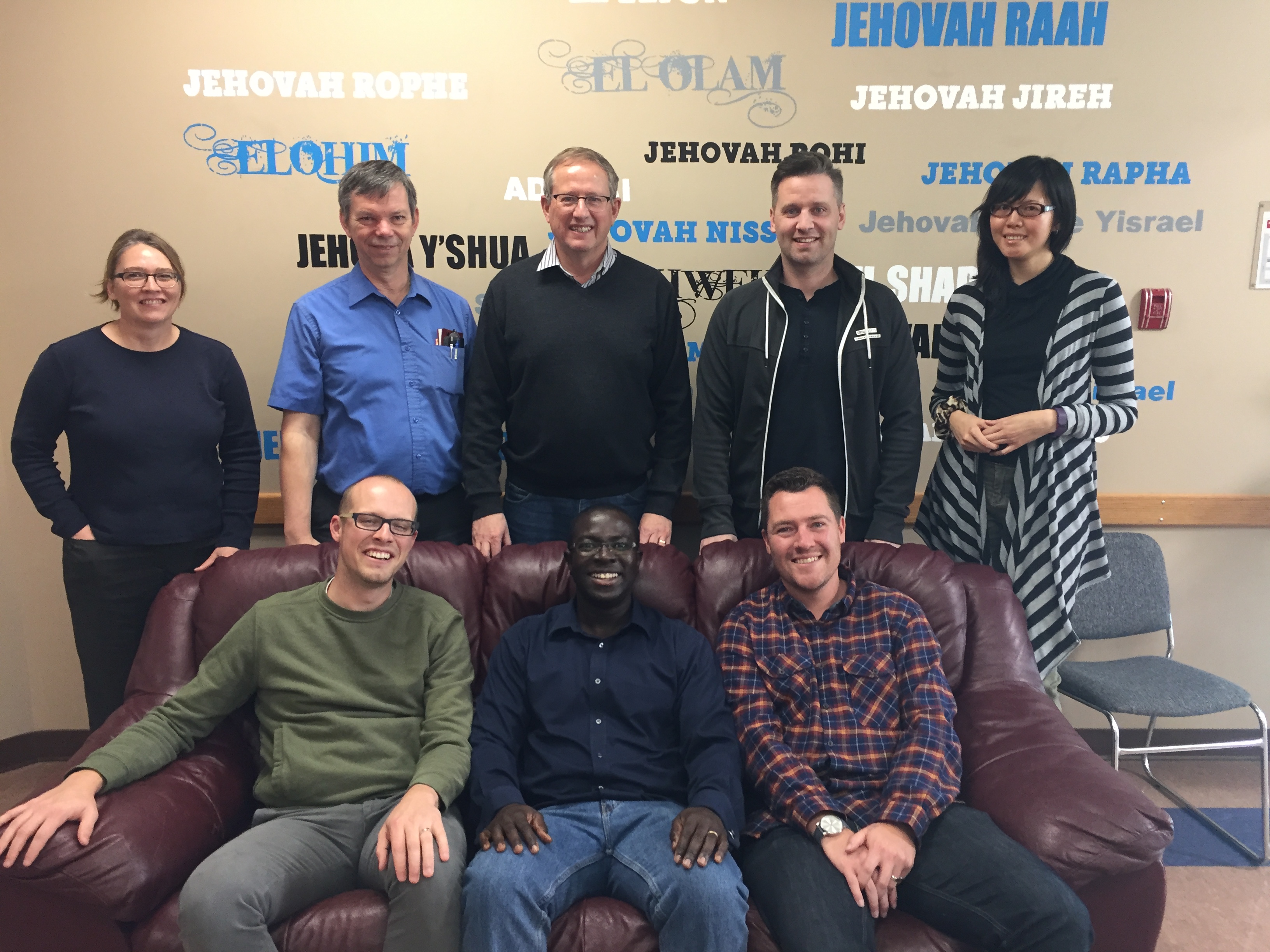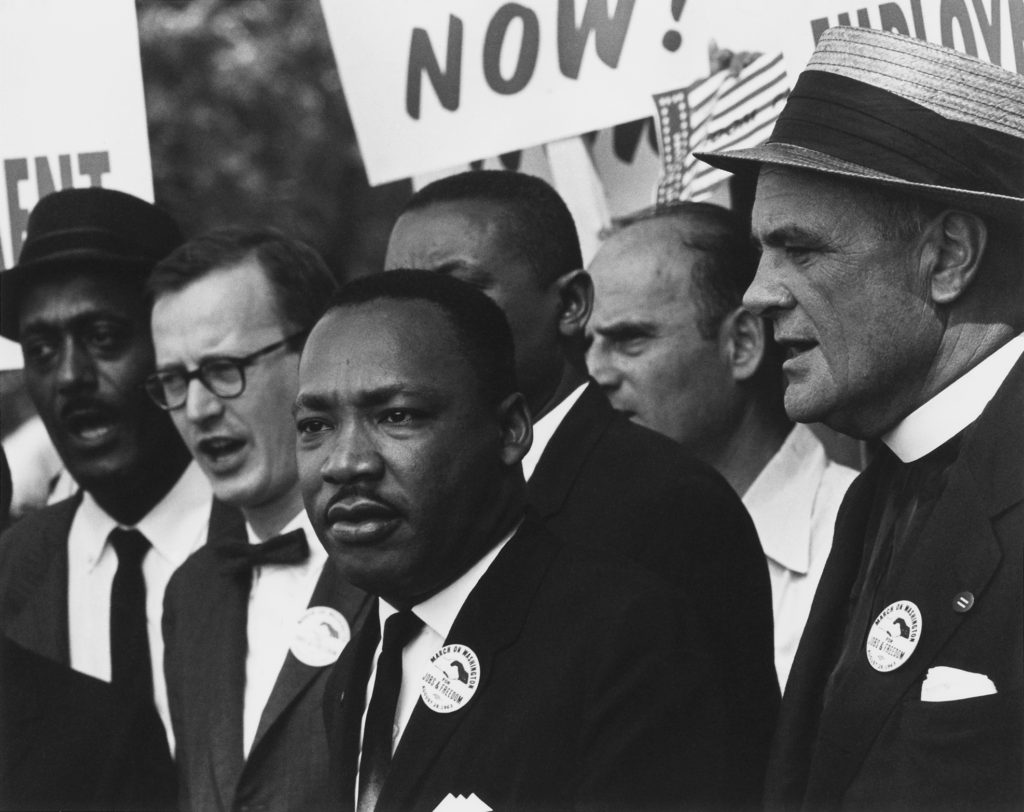COVIDic Times: A WAKE-UP CALL.
By
Dr. Owusu Banahene
At a time when for once leaders of a developing country cannot escape the infrastructure and systems they might’ve failed to build to benefit from someone else’s in the developed world, this presents a fine opportunity to experience the harsh reality for themselves and sit up, post COVID-19. A pandemic is a terrible thing to waste.

An already overstretched Ghanaian hospital pre-COVIDic times (Photo Credit: Prime News Ghana)
I would like to add my voice to concerns that some have have expressed recently about lessons that Ghana should draw from the coronavirus pandemic. This is crunch time for us. It is a wake-up call. There is no doubt that the health system in Ghana would not cope if we were to be faced with even a quarter of the cases that we have seen in countries like China, South Korea, Iran, Italy and Spain, to name but a few. Even Italy, with one of the best health systems in the world, cannot cope. The UK has adopted drastic measures because it recognises that its National Health System cannot handle the expected cases. Equally, the USA does not have enough test kits, ventilators, hospital beds, doctors, nurses etc. to manage the numbers expected.
Ghana’s health system is nowhere close to these countries. Even under normal circumstances, our public hospitals have low capacity—we struggle with shortage of beds, with many patients sleeping on the floor or in corridors. We cannot even deal with Malaria nor vaccines without going cup in hand to the Global Fund and GAVI. Yet, our politicians and governments over the decades have lived and continue to live in largesse. For example, for a small, debt-ridden, low middle income country like Ghana, we have well over 100 ministers, most of whom live in expensive houses in posh neighborhoods provided by the state and drive expensive cars (so-called V8s). Their favourite car, the Land Cruiser, costs about USD 135,000 to buy new. All of these ministers have two or more cars provided by the state.
It is not just ministers. I have seen parliamentary delegations travelling abroad, sometimes about 15 of them. They travel in Business Class. When you engage them in conversation, they tell you about some of their other trips to places like South Africa, the UK, Kenya etc. One gets the impression that they travel frequently and regularly. They get significant per diems on these trips and stay in expensive 4-star and 5-star hotels. I recall one such delegation on a trip to the UK, made up of MPs from the ruling party at the time and the opposition, not to mention their escorts. Most were in First Class, whilst the rest (the escorts) were in Business. Upon arrival at London Heathrow, there was a fleet of Mercedes cars on the tarmac from the Ghana High Commission to meet and collect them. Of course they did not go through immigration and customs like the rest of us did.
Add to the above the corruption and kick-backs from contracts and other rent-seeking activities and you get an idea of the scale of the loot and largesse. In consequence, infrastructure projects such as airports, roads, hospitals, electricity etc. cost twice or more what they should, to say nothing of procurement of routine and regular supplies across the country. These monies, amounting to hundreds of millions of US dollars, end up in the pockets of the politicians, public servants and their cronies.
I could go on, but now, consider what we could have done with such monies at a time like this with COVID-19. Consider the test kits we could have bought, the hospitals we could have built across the country, the isolation wards, the ventilators we could have procured, the number of doctors, nurses and other health personnel we could have trained and retained in Ghana—with all the extravagant spending, waste and corruption of the past three or four decades! We could have been like Singapore or South Korea but, no, our politicians, public servants and their cronies have chopped and wasted the money—and continue to do so.
I hope and pray that COVID-19 would be a wake-up call for all of us. I wish some smart Alec would identify and do an inventory of all the properties and monies, including those stashed abroad, of the politicians and public servants and ask them to account for them. Those that cannot be legitimately accounted for should be confiscated and auctioned, with those monies going into a special fund for development. It is crunch time. It is time for us to wake up!
_______________
COVIDic Times: BE AFRAID.
If we peeled the pandemic panic layer by layer what would we find lies beneath—what are people really afraid of? While not wanting to spread panic is there not a place for encouraging people to “be afraid”?
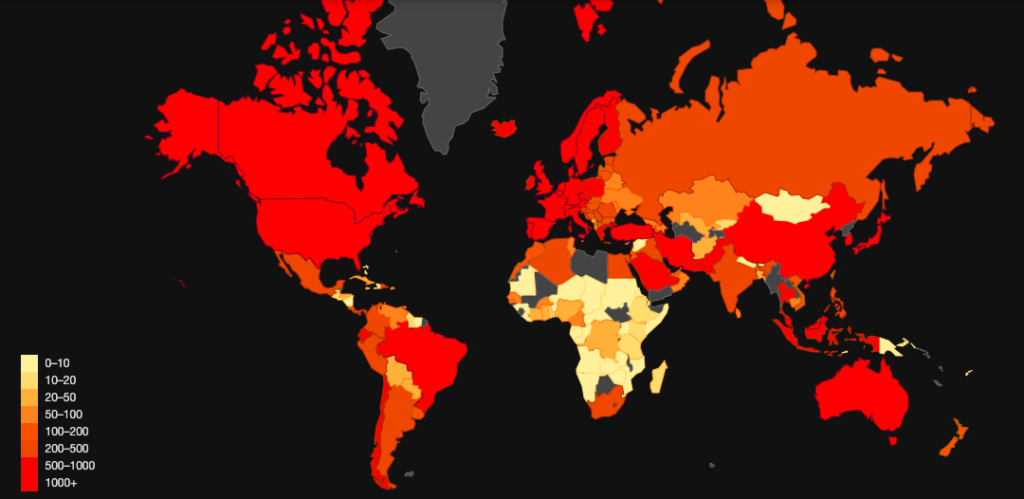
Map showing various degrees of the COVID-19 pandemic globally as of March 23, 2020 (credit: covid19info.live)
The tongue-in-cheek saying that everyone wants to go to heaven but no one wants to die seems rather apt in these COVIDic times. But really, what’s so bad about dying? Most people don’t seem to care enough about how many are recovering but rather fixated on how many are catching the disease and especially how many are dying. At the time of writing this article, the number of COVID-19 cases in the world was nearing 350,000 in 190 countries with approximately 15,000 deaths. These are not just statistics, numbers; they are real people made in the image and likeness of God, with families and friends to mourn them. May their souls rest in peace.
Much of the world is gripped in fear. But I’ve been wondering what people are really afraid of: is it getting sick per se or dying or what happens when they die? It is good to pause and ask yourself the same question, peeling back layer after layer until you find the root cause of any iota of fear that you might have/have had during this pandemic.
BE AFRAID
There have been many scripture verses and motivational messages to calm people down. This is the time preachers remind us that “there are 365 ‘fear nots’ in the Bible, one for each day of the year;” except 2020 has 366 days. Even governments have used hashtags like #SpreadCalmNotFear. While I’m of the preachy and motivational stock and have done my part to share love, spread hope, shout “fear not!” and even generate laughter amidst the virus storm I want to take a sober pause and say BE AFRAID.
Being afraid can be a good thing (or we will all do stupid things). But we ought to be afraid of the right things. It’s a good thing to be afraid to break the law, for instance, or to go after someone’s spouse. Not everyone likes Jesus Christ but no one, not even his sworn enemies, can ignore the fact that he is a real historic figure (it would be as ridiculous as saying Napoleon or Hitler never existed just because you don’t like him), was a prophet and miracle worker (two things both Christians and Muslims agree on), lived a perfectly upright life (unlike every other prophet) and teacher par excellence. Even in a raging storm (like COVID-19 has become in our day) he questioned his disciples”why are you so afraid?” while he rebuked the winds and spoke to the waves and stillness came.
In his often paradoxical pedagogy, once upon a time this teacher par excellence said not to be afraid and to be afraid in the same breath: “Do not be afraid of those who kill the body but cannot kill the soul. Rather, be afraid of the One who can destroy both soul and body in hell” (Matthew 10:28). What did he mean?
DEATH ISN’T WHAT YOU THINK
The new Coronavirus named SARS-CoV-2 that causes the disease COVID-19 can kill the body (your hardware). Ask Italians; 5,500 of them hav died already (at the time of writing). But it cannot kill the soul (your software). Yes, death is “the permanent ending of vital processes in a cell or tissue” or “cessation of all biological functions that sustain a living organism,” and that is good Biology, but death is more than that (according to ‘Soulogy’).
Many equate death with total annihilation. In other words, that once a person dies they just finish; disappear into thin air. C’est fini. That’s it. But no. Death actually means separation. Or as Finis Jennings Dake would put it, “a cutting off from realizing God’s purpose for which he was created. One can logically substitute the word separation for death in every scripture where it is used” (Dake 1991, 619). Consequently being tripartite beings–made up of spirit, soul and body–there are three kinds of death:
1. Physical Death–this is when your spirit and soul (inner man) are separated from your body (outer man). That is where biologically all functions, including brain function, that sustain a person cease permanently, from the micro (cellular) level to the macro (systemic) level. This separation of the soul and spirit from the body is the kind that as a medical doctor I would sometimes (unfortunately) be called upon to confirm: no breathing, pulse not palpable, dilated pupils not reacting to light etc. This physical death is what most people think about when it comes to the subject or our mortality, especially in these COVIDic times. But there is more.
2. Spiritual Death—this is the temporal separation of your spirit and soul from your Source/Maker/God. Or as evangelists like the late Billy Graham would plainly put it, separation of man from God because of sin. According to a Biblical worldview, the moment our forefathers Adam and Even sinned against God in the Garden of Eden, at that very moment (as promised by their Maker) they died. As a little boy I always used to wonder whether God lied about them dying as soon as they ate the forbidden fruit because they were very much alive after that, even running away from God! Now I know that what happened to them immediately was death alright–they were instantly separated from God—spiritual death. Their physical death came later. Hopefully, this makes us understand why since we as Homo sapiens are all descended from that first couple, all of us have inherited the spiritual genetic disease of sin and are born dead. Everyone of us is born separated from God spiritually, thanks to the pandemic from the virus SIN-00.
Paul puts it this way in his letter to the Christ followers in first century Rome: “for all have sinned and fall short of the glory of God” (Romans 3:23). He follows up with the consequences of this, three chapters later: “For the wages of sin is death, but the gift of God is eternal life in Christ Jesus our Lord” (Romans 6:23). Logically, therefore, if we are all sinners by nature and the salary for sin is death then we are all the living dead, from pope to prisoner, separated from our Maker.
3. Eternal Death—this, finally, is being separated from God forever in the lake of fire (hell). This, in scripture, is sometimes called “the second death” because follows “the first death” (physical death). Unlike spiritual death, this is eternal, forever. But eternal death is not entirely unavoidable. This will only happen to those who continue to live in their state of spiritual death until they physically die or Jesus Christ returns. If you remain in your state of spiritual death and you physically die you will eternally die. But there is a big IF because Paul again says that inspite of our state of spiritual death, “But God demonstrates his own love for us in this: While we were still sinners, Christ died for us” (Romans 5:8). God doesn’t just have love; God is love. He does not want anyone to be a victim of eternal death. “For God so loved the world that he gave his one and only Son, that whoever believes in him shall not perish but have eternal life. For God did not send his Son into the world to condemn the world, but to save the world through him.” (John 3:16-17)
Those who hear about Jesus Christ and believe in him as the Son of God who came to die in our place—beyond being a mere historical figure, prophet and miracle worker, righteous man, and great teacher as introduced above—receive his life in exchange; for the only reason he died as a perfect, sinless man was as a sacrifice for you and me. He died a temporal physical and spiritual death he did not deserve in order that you and I could receive eternal life rather than the death sentence on us because of our sinful nature (plus our own sinful deeds on top of that). To the legal luminary Paul, “If you declare with your mouth, “Jesus is Lord,” and believe in your heart that God raised him from the dead, you will be saved. For it is with your heart that you believe and are justified, and it is with your mouth that you profess your faith and are saved“ (Romans 10:9,10).
HOW TO NEVER DIE | THE CURE
So back to COVID-19, fear and Jesus. There is a virus (SIN-00), infinitely more dangerous than SARS-CoV-2 because it has eternal consequences, that has caused a spiritual pandemic with a manifestation of physical brokenness for thousands of years. Jesus Christ says do not be afraid of SARS-CoV-2 and its resultant disease COVID-19 which can kill the body (physical death) but cannot kill the soul (spiritual and eternal death). Be afraid of (or have deep reference for) the One who because of SIN-00 will at the end of the age, as a result of your own choice not to accept the free gift of eternal life, hand you your eternal ticket to a place of eternal separation from Him. I think inasmuch as the fire described in hell is horrific, the real penetrating eternal pain is the forever separation from Love—for God is Love. This is eternal death.
Who doesn’t like cures? Imagine it were announced today that there was now a definitive cure for COVID-19, not just the Chloroquine being experimented with now! How quickly people will line up for it! Well, let me tell you how to never die, COVID-19 or not.
One day a friend of Jesus called Lazarus physically died (you may read the story here). When Jesus arrived at the scene four days later he uttered to his sister one of the most amazing words ever spoken: “I am the resurrection and the life. The one who believes in me will live, even though they die; and whoever lives by believing in me will never die” (John 11:24-26). Understanding the three kinds of death finally allowed me to make sense of this profound scripture: the one who believes in Jesus will eternally live even though they may physically die; and whoever has overcome spiritual death (lives; now has eternal life) by believing in Jesus will never eternally die!
Then Jesus asked Martha, sister of Lazarus, “Do you believe this?” Her response was “Yes, Lord.” And she elaborated further, “I believe that you are the Messiah, the Son of God, who is to come into the world.” May I ask you too: “Do you believe this?” If not, be afraid.
Reference
Dake, Finis J. 1991. Dake’s Annotated Reference Bible. Lawrenceville, GA: Dake Bible Sales Inc.
POST SCRIPT
For those not in my social media circles you wouldn’t know just how much faith, hope and love I’ve been pouring onto the world. I feel the global body of Christ has been very pastoral in this COVID-19 pandemic (much needed, of course) but we ought not to forget our other hand/arm to be evangelistic as well.
It was at the third Lausanne Congress on World Evangelization, Cape Town 2010, that I heard for myself John Piper passionately proclaim the two truths with such wisdom and clarity: “…could the evangelical church say—we Christians care about all suffering, especially eternal suffering? I hope we can say that. But if we feel resistant to saying “especially eternal suffering,” or if we feel resistant to saying “we care about all suffering in this age,” then either we have a defective view of hell or a defective heart” (emphasis mine). Full script and video here.
God help Christ followers balance being pastoral and being evangelistic at this time; ambidextrously handling the rod and staff; flying with both wings of social concern and evangelism, “two wings of the same bird” for the blessing of all peoples of all nations and to God’s glory!
COVIDic Times: Don’t Pitch Faith and Science Against Each Other!
It’s never a good time to pitch religion and reason against each other but certainly not in a time of crisis, especially the kind of COVID-19 pandemic which requires “all [washed] hands on deck!”
Much of my time this morning was spent going back and forth debating on my Achimota School 1995 WhatasApp platform because one member forwarded what was purported to be a Tweet from a prominent Ghanaian journalist: “A country that invests in a $100 million cathedral, and not in medical research, can only pray in times of a global pandemic and hope to profit from the labs of countries that invest in science and technology.”
BLOW AWAY THE CHAFF
The last thing we want to be doing at this time is to pitch faith and science against each other, but before delving into that let me first quickly get rid of the disingenuity of the above statement which seems smart, even sassy, at face value. 1. The $100 million (if that is even accurate) is being raised by a Ghanaian Christian community that for the last 200 years has invested heavily not only in the faith of the Ghanaian people but in agriculture, schools, hospitals (including these supposed medical research centres) and the like. The government of Ghana isn’t raising the money for the cathedral–they gifted the land and seed money as their contribution but the body of Christ in the nation is doing the rest. 2. As I’ve stated elsewhere, nation building is complex: “We are building a nation here, a cohesive entity that must have spirit; not just a conglomeration of social services!” 3. Many of these countries that are being touted today as having ‘rather’ invested in science and technology have a rich faith heritage and foundation, including national cathedrals, that was part of the tide that raised them to where there are. Today they are becoming so secular to the point of amnesia! They ought to remember the rock from which they were hewn! 4. Throwing in a thorny issue at a time of national and global crises when the last thing we need is polarization is just not on; quite insensitive, actually. 5. To say one “can only pray in times of a global pandemic” is not only condescending and treating faith with disdain but unnecessarily pitting it against reason, faith and STEM. The last point is what I want to dwell on for the rest of this blog.
DOUBLE POWER
My immediate response to the said journalist’s statement is: The opposite is true also. A country that does not invest in the spiritual wherewithal of her people can only rely on science and technology, which evidently aren’t enough in the face of monstrous situations like the COVID-19 epidemic! Today, amidst the Coronavirus pandemic, doctors and scientists are using words like “hope,” “faith” and “pray.” Prayer is powerful; ask how I know!
Perhaps I’m in a unique position to speak to this issue as I am a medical doctor myself and a preacher. Double power! I prescribe medication but I also pray for people. Double power! The secular humanists only has science/technology; I have faith and science/technology. Double power! Why would anyone want to use only the right or left brain; one hand/leg instead of both (if they have them)? Why would any bird want to attempt to fly with only one wing? Why pitch faith against science when the same Lord God made both and wants everything in us and His world to be used for His glory? Double power, friends! That’s why I like the painting above that admonishes us to “wash and pray.” “Faith without works is dead,” said the apostle James. As my reverend minister likes to say, “Trust in God and lock your car.” God does miracles (the supernatural) on occasion and has also given us a bunch of principles for daily (natural) living.
Check out the double power response of Martin Luther (the Reformer) to one Rev. Dr. John Hess in a letter “whether one may flee from a Deadly Plague.”
FALSE DICHOTOMY
I have watched with amusement as various world leaders respond to the COVID-19 crisis. Again, I may be in a unique position in experiencing both ends of the spectrum as a Ghanaian (largely religious) and Canadian (largely secular). Within the same 24 hours, the Canadian Prime Minister (whose wife has tested positive and who is himself in isolation) made a broadcast admitting he was as flustered as everyone else but generously offering practical measures to curb the debacle, the Ghanaian president called a number of church denominational leaders to the seat of government (Jubilee House) to pray! I am one of the 13,000 who joined in that prayer meeting via FaceBook Live and I loved his opening remarks. He said (to paraphrase), yes we have put health measures, travel advisories, financial resources etc. in place but we need more–to call on the God of Heaven as other leaders and nations have done throughout history and even now (we know the United States presidency also called for a national day of prayer on Sunday March 15). The Ghanaian president’s kind is an endangered species, one of few in the modern world who do not separate the physical and spiritual realms.
Consider Myers’ table above. How did we get here, to a place where the modern worldview is so dichotomous?! Pitching faith and reason against each other goes back centuries, perhaps peaking during the Enlightenment (17th to 19th century) in Europe. Yet we forget that Newton, Kelvin, Faraday and a host of other scientists were people of faith, specifically of the Christian faith. Does one’s faith make them a better or worse scientist? Of course not all scientists have faith–such is the beauty of the free will of humankind.
CONCLUSION
Faith leaders, this is not a time to be playing down rigorous reasoning and true science (for o yes, there is such a thing as pseudoscience) and flouting the basic public health protocols provided. Secular leaders, this is not the moment to look down on people of faith–who knows, their prayers may be keeping you alive!
I am right-handed but would hate to be only one-handed! I am a person of faith and reason, science and religion. I admit that Truth tends to be paradoxical and managing the tension between two ends isn’t a comfortable place to be but I’d rather fly with both wings than attempt to soar on one alone–impossible! Again, let’s not fall for the tyranny of the ‘or’ but embrace the genius of the ‘and’ (Jim Collins). Wash your hands and clean your hearts. Social distancing doesn’t imply spiritual distancing. Pray hard as if everything depended on God (it really does!) and work hard (especially those of us on the medical frontlines as well as in the background slaving away in labs trying to make vaccines) as if everything depended on you (humanly speaking, it does).
In many things, our world is polarized: female versus male, poor versus rich, secular versus sacred, spiritual versus material, church versus state, private versus public, evangelism versus social action… Please let’s not add science versus faith, especially in this time of crisis!
Reference
Myers, Bryant L. 2011. Walking With the Poor: Principles and Practices of Transformational Development. Maryknoll, NY: Orbis Books.
What Transpired in Court: a Blow to Blow Account
The day after my trial I sent a newsletter to all my family, friends and ministry partners around the world who had been praying for righteousness, truth and justice to prevail, giving them a ‘blow to blow’ account of happenings on that eventful day, November 28, 2018. You may read it here. Acquitted! Discharged!! Free!!!
You don’t know You if you don’t know God—and vice versa.
With all due respect, we are fooling ourselves if we think we can know ourselves without knowing God or know God without knowing ourselves. You can’t have one without the other. Here’s why.
“MAN, KNOW THYSELF”
We shall not even begin to delve into the convoluted Egyptian and Greek history that tries to explain the origins of the poignant phrase, “know thyself.” Suffice it to say that in leader development, many practitioners like me are in a hurry to get to exciting things like vision and mission and to teach skills like communication, team-building etc. but when we skip the essential task of helping people to first discover more of themselves, pay attention to themselves, there is imminent danger on an already treacherous leadership journey. “Man, know thyself,” said Socrates and apparently many other ancient Greek sages.
There are many reasons why self-awareness is important, like discovering the strengths and weaknesses of one’s personality (DISC, Enneagram or Myers Briggs as examples), uncovering how one’s ancestry affects their present attitudes, emotions and actions (using a genogram, for example), unveiling blind spots, discovering one’s giftedness (eg. using a StrengthsFinder assessment), exploring one’s cultural values (basic values survey) etc.
All that being said, it may astound you how knowing ourselves and knowing God are inextricably linked.
SIAMESE TWINS
I don’t know if using conjoint twins is the best analogy for illustrating this but Scripture, church history, current research and umpteen experiential anecdotes have proven beyond doubt that “a heart to know God more intimately requires an openness to discover oneself more truthfully” (Reese 2012, 57) and vice versa; also, that “true knowledge in the life of faith is always a “double knowledge.” We cannot know ourselves without knowing God or know God without knowing ourselves.
ANCIENT WORDS
Just check out what a few significant voices from the past have said about this double knowledge for nearly 2,000 years:
- Augustine (354-430): “Grant, Lord that I may know myself that I may know thee.”
- Bernard of Clairvaux (1090-1153): “Know yourself and you will have a wholesome fear of God. Know God and you will also love God. You must avoid both types of ignorance, because without fear and love, salvation is not possible. Without knowledge of self, we have no knowledge of God.”
- Julian of Norwich (c. 1342-c. 1416): “For our soul is so deeply grounded in God and so endlessly treasured that we cannot come to knowledge of it, until we first have knowledge of God, who is the Creator to whom it is united. …And all of this notwithstanding, we can never come to the full knowledge of God until we first clearly know our own soul.”
- Thomas à Kempis (c. 1380-1471): “a humble self-knowledge is a surer way to God than a search after deep learning.”
- John Calvin (1509-1564): “Our wisdom, in so far as it ought to be deemed true and solid wisdom, consists almost entirely of two parts: the knowledge of God and the knowledge of ourselves… The knowledge of God and the knowledge of ourselves are bound together by a mutual tie.”
- Blaise Pascal (1623-1622): “To know God and yet know nothing of our own wretched state breeds pride; to realize our misery and know nothing of God is mere despair; but if we come to the knowledge of Jesus Christ we find our true equilibrium, for there we find both human misery and God.”
PAY DOUBLE
No wonder the apostle Paul said to his mentee “pay close attention to yourself.” Of late I have staged a ‘rebellion’ against corporate leadership and the self-help/motivational industry because of the wanton decoupling of ‘religious life’ from reality. My frustration with church leadership also is when “these answers we know from Scripture” and “the questions we have in our life” are not really matching up well (Reese 2012, 60) and all this theology doesn’t seem to go anywhere or land in reality.
The most liberating thing for me in the final chapter of David G. Benner’s The Gift of Being Yourself is that “genuine Christ-following will always make us more, not less, human” (88). And I adore the Lord Jesus Christ for showing me the way: “By becoming fully human, Jesus leads us to the fulfillment of our humanity. By being fully God, he leads us to God” (88). Hallelujah!
As Benner puts it, “The anthropological question (Who am I?) and the theological question (Who is God?) are fundamentally inseparable” (83). I have become very, very, very, very wary of a multi-billion dollar self-help/motivational industry that has no place for God. Very. Or a musty theology that is not grounded in the reality of being human. Double knowledge, my friends. We’ve got to pay attention, twice.
Works Cited
Reese, Randy D., and Robert Loane. 2012. Deep Mentoring: Guiding Others on Their Leadership Journey. Downers Grove, IL: InterVarsity Press.
Benner David G. 2015. The Gift of Being Yourself. Downers Grove, IL: InterVarsity Press.
I DON’T CARE HOW GOOD YOU ARE (#2)~If you’re not a ‘walkie-talkie’
When “what people say, what people do, and what they say they do are entirely different things” (Margaret Mead) we’re in real trouble. On this Father’s Day, I want to honour the one person, of all the leaders I know in this world, who I can vouch for as walks his talk: my own father.
WHO SAID WHAT?
In my head I was debating whether or not to continue this “I Don’t Care How Good You Are” series on character, ethics, morality and integrity when I chanced upon an quote from the newly-launched book of a dear family friend (actually my Dad’s Best Man nearly 40 years ago!): “What a person truly believes isn’t what they think or say, it’s what they do” —Queenie in Lark Rise to Candleford. That was it; that was my confirmation to do this piece. So let’s roll with another in this character series. But this one is very special because it is dedicated to my own biological father.
In many places and pieces of literature, even in Scripture, the life we lead is often referred to as our “walk.” Let’s examine what it means when our talk (what we say we believe in, who say we are or what say we do) doesn’t match our walk.
WHY DAD?
If there ever was a man of integrity I could vouch for it is my father: Reindorf Kofi Baah Perbi. In fact, even way back in the 1980s during his days as Chief Accountant at the then Social Security Bank (now SG-SSB), when his signature was forged and monies stolen it was his integrity that saved him. Everyone vouched for him: “Chief would never do such a thing,” they convincingly told the authorities.
Those were the heady days of revolution and military rule in Ghana so he had even received a pre-judicial slap or two already when he was picked up by soldiers and sent to Gondar Barracks. After several weeks of tribunal hearings (and I remember us going to fetch him from tribunal hearings after we had been picked up from Ridge Church School), eventually, the perpetrators were found, tried and shot via firing squad. It was no joke. One of them, I believe, is still on the run—he must be still running now or dead from running.
When Dad retired as Ghana’s Deputy Senior Partner of KPMG (one of the ‘big four’ accounting firms in the world) in April 2015, it was humbling to hear how many of his accounting, management consulting, and audit colleagues honoured him for this one thing: integrity. I sat at those banquets (yes, there was more than one! Lol!) soliloquizing, “I want that. When all is said and done, that’s the kind of man I want to be!”
LAYING IT DOWN
Contrast Dad with Kenneth Lay, who was the CEO of Enron. He played a leading role in the corruption scandal that led to the downfall of the Enron Corporation. Unfortunately, Lay and Enron have become synonymous with corporate abuse and accounting fraud since the scandal broke in 2001.
In an interview with the indefatigable Larry King of CNN, after pleading not guilty to criminal counts having to do with his leadership at Enron, these were Mr. Lay’s words: “I lived my life in a certain way to make sure that I would never violate any law – certainly not criminal laws – and have always maintained that most important to me was my integrity, my character, and my values.”
Something doesn’t add up here because in 2004, Lay was indicted on 11 counts of securities fraud and related charges. He was found guilty on May 25, 2006, of 10 counts against him which meant he could face anything from 20 to 30 years in jail. However, only three-and-a-half months before sentencing, Kenneth Lay died of a heart attack while vacationing.
Same thing with Bernie Madoff who founded a Wall Street firm in 1960 of which he was chairman until his arrest on December 11, 2008. He would soon plead guilty to 11 felonies, having turned his wealth management business into a massive Ponzi scheme with almost $65 billion of fabricated gains. Yet hear his defense attorney, Daniel Horowitz: “…Bernard (Bernie) Madoff is a longstanding leader in the financial services industry. He will fight to get through this unfortunate set of events. He is a man of integrity.” Madoff is currently serving a life term in a federal prison for his kind of integrity.
STRANGE ANIMAL
Did you not just read Mr. Lay saying integrity was most important to him? In my short life, perhaps there is no word I’ve found more misunderstood and misappropriated than the word, “INTEGRITY.”
Integrity comes from the Latin root integritas, which means entire or whole. It’s the word from which we get “integer” in Mathematics. It may help to remember that integers are positive or negative whole numbers. To have integrity, therefore, means you are whole, you are one: your private and public lives are one; your charisma and character jive; what you say and what you do are in sync.
Extending the Math metaphor, a life of no integrity on the other hand is fractionated—instead of integers, we have fractions. That is when the Yaw you see behind the pulpit is different from the Yaw you see at the pub; and different from the Yaw you experienced on vacation in Panama; who is also very different from the Yaw at home… Sadly, not too long ago even a pastor whose public image did not match who he truly is was exposed on CNN.
THE ONLY TIME I BELIEVE IN ATHEISTS
When it comes to integrity, I dare say that many non-religious people, even atheists, have more integrity than many so-called religious people. This is what I mean. If Steve says, “I lie, I deceive, I steal.” Steve has low morality. When Yaw says, “I abhor lying, I don’t deceive, I never steal,” he has high morality.
BUT, if Yaw goes on lying, deceiving and stealing then Yaw is not a person of integrity. He doesn’t walk his talk. However, if Steve goes ahead to lie, deceive and steal, although he has low morality he actually is a person of integrity (albeit in a very twisted way) because he walks his talk. He said he will do these and he does.
The extent to which your walk and talk jive is the extent to which you are a person of integrity.
WANTED: WALKIE-TALKIES
I’m not perfect; none of us is. Many times I haven’t kept my word—including keeping appointments. It isn’t a perfect world either; stuff happens that alter our good intentions. One thing I do, however, is strive to call or email and apologize profusely, letting the person know I had every intention to keep my word but now very sorry I’m unable. The Psalmist David, takes this even a notch further saying a person of integrity is one who keeps his/her word, even when it hurts.
Integrity doesn’t mean you are perfect; but it sure means that when you ‘mess up’ you quickly and truly ‘fess up’. That is what made God call David, albeit an adulterer and a murder, a man of integrity (Psalm 78:72), even “a man after my own heart.”
I have observed with shock how people say things they don’t mean and mean what they don’t say; and say things they have no intention of ever acting on. Time wouldn’t allow me to go into my private disappointments in the lives of public speakers whose private lives don’t measure up to their public statements or images. And they have no qualms about it. The Lays and Madoffs did not just wake up one day and find themselves in court—a little slip, a little lie, and slowly slowly but surely surely down a slippery slope we go.
It doesn’t matter how good you are at what you do (skill, talent, gifting). If consistently what you say does not match what you do (walk), I shan’t hire you. Or if I do by mistake or because I want to give you a chance, you’re already on the firing line—it’s just a matter of time, if nothing changes. The world has billions of smart phones; what we need now is truly smart people. We need more walkie-talkies—people who walk their talk and talk their walk.
Thanks Dad, for showing me the way. Happy Father’s Day!
Corporate Leadership and Cross Leadership are not Synonymous!
There is a huge intersection between leadership principles in the corporate world and the church. But the former has its limits. It stops at the junction of the cross, if it isn’t willing to go that route of ‘cross leadership.’ Here’s how.
Note: the following write-up is adapted from an Integrative Paper of the works of Lingenfelter and Bosch (see ‘works cited’ below) submitted to my Fuller Seminary Masters in Global Leadership Class.
HOW IT ALL BEGAN
For years I’ve learnt, practised and taught corporate leadership principles, in a variety of fields from medicine through media to the military. So when Sherwood Lingenfelter respectfully acknowledged Banks and Ledbetter’s description of leadership and yet asserted that it is “inadequate for Christian ministry” he got my attention! Why would he say that?!
In fact, the exact quote is as follows: “Banks and Ledbetter go on to define the characteristics of leadership in terms of vision, setting direction, monitoring trends, and motivating and inspiring people to follow. Their insights are helpful as we seek to answer the question, what is leading? Yet secular and business perspectives on leadership are inadequate for Christian ministry” (Lingenfelter 2008, 16, emphasis mine).
Professors Lingenfelter and Bosch are both academicians with immense cross-cultural leadership praxis. Dr. Sherwood Lingenfelter, an American anthropologist is provost emeritus and senior professor at Fuller while Dr. David Bosch, who died in a fatal car accident in 1992, was a South African missiologist and professor at the University of South Africa.
Lingenfelter has a five-fold goal for his book (Lingenfelter 2008, 8-9) with the bottom line being the establishment of covenant relationships for effective cross-cultural leadership. Bosch seeks to define what spirituality is, particularly challenging the notion that it is ‘otherworldly’ rather than ‘on the road’ (Bosch 2001, 9-13), when really “being spiritual means being in Christ” (13).
WHY WE FIGHT AND FAIL–AND THE WAYS OUT
I briefly explain four key reasons Dr. Lingenfelter gives for the conflicts and failures people often face in ministering and leading cross-culturally. First, Lingenfelter argues that not only is building mutual trust within a united relational community the first characteristic of leading (Lingenfelter 2008, 16-17) but that “transformation of teams into covenant missional communities” (9) is a sine qua non. This comes before vision, strategies, goals or task-focused projects (167). A leader ought to prioritize the creation of a covenant community in which team members commit first to one another as people of God and then to working together as one on the mission of God (26). When this is not prime and proto, we set ourselves up for fights and failures in cross-cultural ministry and leadership for sure.
Forming this covenant community is crucial because as Bosch says of an ambassador, “he is a personal representative of his government, the very embodiment of the one who sends him” (Bosch, 43) so are we first and foremost the body of Christ. No doubt, “there are the problems of forced togetherness with incompatible personalities…” (44) yet at the same time “our relationships are then guided not by logic but by the illogic of love that flows from grace,” (Lingenfelter, 50) for how else shall we “be able to transmit these intimate experiences of the love and grace of God to other people in any other way than by walking this road with them”(Bosch, 69)?
Lingenfelter’s recommendation is that this covenant community is built through relational engagements which inspire the confidence and trust of team members, just like Jesus did (Lingenfelter, 17). Another great way to do this is through transformational worship (170).
Secondly, conflicts and failures of cross-cultural ministry and leadership arise as a result of conflict of values (Lingenfelter 2008, 69) since “all Christian leaders, regardless of their cultural background, carry their personal histories and cultural biases with them wherever they serve” (15) even if unbeknownst to them with unintended consequences of disobedience and ineffectiveness (9). The way out starts by humbly positioning oneself as a learner, to understand one’s own values as a culture-bearing person then investing time and resources to learn and understand the contrasting values of others on the team, and ultimately to learn how to add to one’s cultural repertoire to be effective in cross-cultural ministry (Lingenfelter, 7-8, 26). This is primarily achieved through dialogue, conversation after conversation (165-167). The good news is that “the Bible gives us principles for living that transcend both our human sinfulness and the prison of our culture” (9), the most pertinent and foundational for other values being Jesus’ expectation of those who want to follow him in the work of the kingdom to deny themselves and take up their cross daily first (48-49).
Thirdly, lack of or loss of a sense of vision and mission is another major problem (Lingenfelter, 164). For starters, “when the wonder of the kingdom of heaven” is not unfurled and clearly elucidated none will be “willing to leave everything and follow” (17). Even then in popular parlance, “vision leaks.” The solution? Repeated attention and intentional renewal of vision, mission and/or values (164). Even, “Paul’s spirituality was… renewed again and again from within” (Bosch, 20).
The final ‘thorn in the flesh’ of cross-cultural ministry and leadership is the issue of power. Since “…all people are inherently “power seekers,” …team relationships will be fraught with struggles for power and control” (Lingenfelter, 26). The way out is biblically based, Christ-centered, power-giving leadership (9) which is quite content to be rejected and discredited as “unknown men” (Bosch, 20), vulnerable (65) and has “the courage to be weak” (75), “…living in a gentle tension between giving ourselves in full surrender to our fellowman, yet at the same time enjoying the peace of the Lord” (23).
THE NUMBER ONE CURE
The prime solution, which cuts across all the array of cross-cultural ministry and leadership problems and failures, is the cross, “the defining metaphor for leadership given by the Lord Jesus Christ” (Lingenfelter, 168). Bosch concurs, with his “third way” assertion (15); albeit not a “domesticated cross with a handle” (32). This means denying ourselves and sacrificing some significant aspect of our ministry, for our brothers and sisters (Lingenfelter, 169). Here, the act of taking to time to worship God at the cross and surrender (170), especially in the midst of debriefs (88), makes it all happen.
The first issue of intentionally building covenant communities really struck a cord with me. The weakest thing I saw (and it had even been researched and documented) coming into my new role at International Student Ministries Canada four years ago was an absence of strong leadership that cast clear vision for the mission and the wider body of Christ. Having been gifted in this area I came on with full force doing just that, only to find resistance in some quarters all the way to mistrust in others. Although I did a fair bit to relate to and consult with as many staff as possible I now know it was not only enough, but may have even been perceived as just a means to my real end—vision—not relationship for its own sake.
Now from Lingenfelter I know better, that even before vision comes a full-on covenant commitment to nurture covenant community. That is my number one job as President of this strategic cross-cultural mission, and I am more intentionally pursuing that with my national senior leadership team first. I particularly would want us to make worship at the cross central in this pursuit of an effectual, united, covenant community of mutual trust.
True, there is a huge intersection between leadership principles in the corporate world and the church. But the former has its limits, especially if we are to effectually lead cross-culturally. It stutters and stops at the junction of the Cross, because more often than not corporate leadership is not only unwilling but even unable to go that route of ‘cross leadership:’ the vision of the cross, the way of the cross, the attitude of the cross. It is a that to take up Christian leadership is to take up one’s cross.
Works cited
Lingenfelter, Sherwood. 2008. Leading Cross-Culturally. Grand Rapids, MI: Baker.
Bosch, David J. 2001. A Spirituality of the Road. Eugene, OR: Wipf & Stock.
IN LOVE WITH ANOTHER WOMAN
What if it’s really NOT “a man’s world” as much as we think and neither is God a He?
This is the morning after. I woke up yestermorning in love another woman. And I didn’t even realise till much later after sunrise when both people and birds alike began to tweet that the day was special: International Women’s Day (IWD). Just as well!
In my readings that morning—which had nothing to do with IWD but an attempt at chipping away at some assignment from my Master’s programme—I was impressed by Deborah. I fell in love with her. For those who think multi-tasking and role conflict is a (post)modern phenomenon, think again. Debbie was leading Israel as a prophet, a wife, and a judge (she reminds me so much of Ghana’s first and only female Chief Justice—ayekoo, Auntie Georgina! another mother of mine). By the way, those who use the Jewish Bible to veto women’s right and female leadership might need to be reminded that those same Jewish people in the 1960s elected a woman, Golda Meir, as their fourth prime minister. Incidentally, there’s something about March and women—she was elected on March 17, 1969, after serving as Minister of Labour and Foreign Minister. A feat the United States of America wouldn’t, or rather couldn’t, do with Hillary Clinton in 2016.
But I digress. Back to the woman I fell in love with yesterday, Debora. Not only were the masses going up to her to have their disputes decided, when she would send for prominent men like Barak (not Obama—but could very well be if she were living today), they would show up and she will command them what to do (I can see some men squirming already).
WHEN A MAN ___ A WOMAN
What did you fill in the gap with? Did you say, “When a man loves a woman”? If you did, I’m not surprised. There’s hardly a romantic song more popular than that Michael Bolton hit yet as I read about my newfound love this International Women’s Day I wondered why When a Man NEEDS a woman is not sung much? I don’t know if anyone has put a tune to lyrics like that (educate me!) but the Barak fella I was telling you about, wouldn’t even go into battle without Deborah! She was that powerful.
Despite a clear instruction from God to the warrior, hear his plea to Deborah: “If you go with me I will go, but if you don’t go with me, I won’t go.” Although “When a loves a woman” seems to be such a complimentary song to the fairer sex, I dare say, “When a man needs a woman” would be even more honouring. Especially, when it has nothing to do with romantic butterflies in the stomach! Surely, there’s more to a woman that eros? Was Barak a weak man or a wise man? We’ll soon find out.
GOD TOO?
I have a thing for women. And it seems I’m in good company. God too. Time and space won’t allow me to run through all the ways women are honoured throughout Scripture but what if I told you God was a She?
During IWD I had thought of throwing a social media challenge to dare all my friends to refer to God as She yesterday, only yesterday, to see their reaction. Maybe another day, DV. The first time I heard someone refer to God as ‘She’ I fumed! There must have been smoke coming out of my ears and nostrils! But stop to think about it for a moment.
Incidentally, while I was tossing and turning this thought about in my mind I received the latest publication of a Jewish organisation whose board I serve on with the same issue being addressed. Rich Robinson began his Jews and Gender article by sharing a jabbing story.
“I took a class in theology once, the kind where the professor had an exotic (to an American) Scottish brogue and brought a unique viewpoint to nearly everything. The day came when someone asked him, “Why is God always described as ‘he’ in the Bible? Why isn’t God ‘she’? How come God isn’t female?”
The Professor thought for a moment and then gave a succinct two-word answer: “He is.”
Wow! It is true that while more often than not God is typically depicted in masculine terms (father, king, warrior, bridegroom) there are also several places in Scripture where God refers to Himself in female terms. For example, “As one whom his mother comforts, so I will comfort you…” (Isaiah 66:13). How about this one, “Can a woman forget her nursing child, that she should have no compassion on the son of her womb? Even these may forget, yet I will not forget you…” (Isaiah 49:15-16).
Sometimes you have God as both father and mother in the same breath, like “You were unmindful of the Rock that fathered you, and you forgot the God who gave you birth [mothered].” (Deuteronomy 32:18) Another masculine and feminine imagery of God together in the same space is this: “The LORD goes out like a mighty man, like a man of war he stirs up his zeal, he shows himself mighty against his foes. For a long time I have held my peace; I have kept still and restrained myself; now I will cry out like a woman in labor; I will gasp and pant” (Isaiah 42:13-14). I will suggest you read Robinson’s the full article here. It just might shift something in you.
While (post)modern feminists, fundamentalists and theologians debate these gender issues, I find it interesting that my dear (and only) wife’s tribe in Ghana, West Africa, the Ga people, have for ages rightly referred to the Almighty as “Ataa Naa Nyomo,” Ataa (male) and Naa (female). Translated, “Father-Mother God.” Ironically, Prof. Mercy Oduyoye states, “The older understanding of God as both male and female…has been lost in modernity.”
SO GOD IS A WOMAN?
So is God a man or woman? Is He bisexual? Or is He all the 58 genders on Facebook (I bet you didn’t know that!)? Two things: First, God is God. He is beyond gender. But secondly, God created mankind is in His own image—male and female. It takes both genders to properly display God’s full image and glory. One gender is woefully inadequate to express God’s image; just as one race is grievously insufficient to display His full picture.There are strengths male men have
As with all personalities and groupalities, when it comes to gender as well there are strengths that male men have that female men don’t and vice versa. When we get into the fights about who’s better or weaker, we miss the point. Some people’s left hand is weaker or less dextrous than their right; for others (like my mother and sister), it’s the opposite. But all of us will agree that we’re better off with both. And o, even to be ambidextrous!
MAN ENOUGH; GOD ENOUGH
Today, I honour all the women in my life for making me a fuller man—my wife, my sisters, mentors, mates, mentees and co-workers. As for my mother, I wouldn’t even be a man at all—not even born in the first place—but for her. Every man came from a womb-man. And for those women who are still underpaid, be assured, the day will come when those who undermine you will be payed back their due and more.
I am man enough to say I need a woman. And you? Are you woman enough to say when you need a man? As for God, don’t worry about Him. He is God enough to stomach all our gender nonsense. Again you ask, “Is God a female?” “He is.”
Of Noble Dreams and “Shitty Stories”
Anybody who knows me well will tell you that the use of such a vulgar slang like “shitty” is uncharacteristic of me. This week many joined Americans to celebrate Martin Luther King Jnr. Day. While great progress has been made regarding race relations in North America we still have a long way to go. Some white officer just showed me so!
SPEAK NO EVIL
Once I went all the way to defend myself in a court of law in another province of Canada, a three-hour flight from home, because I felt the police officer who had stopped me months prior was prejudiced because I was black. Even three-and-a-half years ago when I became the first black president (and only black staff at the time) of a predominantly middle-age, white Canadian organization someone came to inform me about one unhappy staff who was wondering, “Why did they [the board] bring this African here to lead us?” I could write a whole book on times I’ve felt ill-treated just because of the colour of my skin.
However, I try to avoid writing on racial tensions, in particular black/white issues, for a number of reasons (which I shan’t enumerate here); but like us all, when it really hits close to home we bury our ‘political correctness’ and as Nike says, “just do it.” As a black man living in North America, I have faced covet and overt discrimination—including being hooted at in a restaurant in southern Ontario by a white woman who I bet hadn’t ever left her province before let alone seeing the rest of the world—but none has gotten to me like the one last Friday. And it’s hard to forget because it was the infamous Friday the thirteenth (13/01/2017).
BLUE AND GREEN
My wife is the Chief Operating Officer of Adeshe Real Estate. As I’ve shared before, we believe in investing in assets towards financial freedom. Because she wanted to check on a property she recently purchased in Champlain, NY (the last major town in upstate New York before crossing the border into Quebec, Canada) last Friday we all decided as a family to go along with her just for the ride.
Out of my own stubbornness (that’s another subject for another day) I have not picked up Canadian citizenship or passport so whenever we travel it is a very interesting array of five blue Canadian passports and one green Ghanaian one—mine. As a result, usually I’m the one who delays the rest of the family at the border because I’m often asked to go into the U.S. Customs and Border Protection (CBD) building to receive an I-94 form to enter the States. This time, I was quite exhilarated that this wouldn’t be necessary because I had kept by last I-94 form intact in my passport since I got it last July six months prior. In fact, it was due to expire the next day (January 14) and so I planned to leave it with the Canadian border authorities upon our return from Champlain before re-entering Canada. Nothing could’ve prepared me for what was about to happen in Obama’s America.
BLACK AND WHITE
Had I known what was about to transpire I might not have changed from the lane of cars I originally was in. There weren’t too many cars at the border so barely two minutes after I switched lanes we got to pull our grey Dodge Caravan, laden with the Perbilets, to the window of Officer Robert.
After the initial pleasantries I handed him the deck of passports as he asked, “Where are you headed?”
“Just over to Champlain,” I confidently responded.
“What for?” he continued his inquiry.
“To check out a property we purchased over there?” I replied.
And that is when he lost it… This young, white kid (probably 20 or 21 years of age) then says, “THAT IS SUCH A SHITTY STORY!”
“What? Excuse me?” I retorted in disbelief. “Did you say “Shitty Story?”
Officer Robert not only had no remorse but in addition, decided to ask us to proceed into the building I was hoping I could avoid a waste of time in.
“Why do we need to do that?” I insisted, “since I have a valid I-94?”
The young man in his white prejudice had either been blinded to that fact or couldn’t care less.
“Too bad, you still have to go because I’ve already punched it in the system that you’re heading there.”
I expressed by utter disgust at his unprofessionalism and promised I would report him to his supervisor. Again, he couldn’t be bothered.
STUPIDITY, LIKE SUCCESS, HAS NO COLOUR
So we dragged ourselves in our annoyance—a family of six, with four children bundled in cumbersome winter jackets, hats and stuff—into the building. My wife Anyele was fuming; going gaga! And she had every right to.
The officer who received our documents inside wondered why on earth we had been asked to come and see her when I had a valid I-94—and even planned to return to Canada not just the same day, but even in less than an hour’s time! She just handed our passports back to me and asked us to proceed but I wouldn’t let this slip by without a fight. I told her I wanted to see their supervisor.
When I did launch my complaint against Officer Robert—from his rude attitude through to his uncouth, vulgar “shitty story” statement to his incompetence (can’t even read a date!) in sending us into the building—she casually apologized and said she would have a conversation with the young man but I noticed what really got her taking me very seriously was when I said, “I’m going to put this on FaceBook.”
She made a copy of my passport and handed me a formal complaint sheet to fill and submit. They’ll be receiving it soon, DV.
RED & WHITE STRIPES
I have travelled to some 30 countries and sometimes met with some very annoying circumstances but honestly I have never felt more disrespected at an international border. The last place I would think would be Obama’s America.
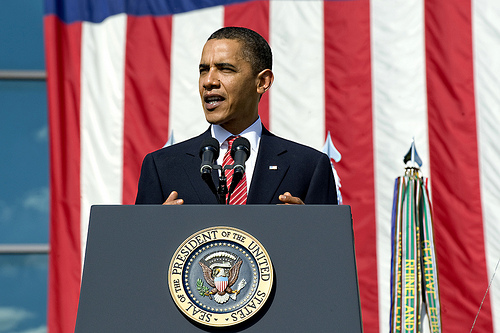
President Obama with background of broad red and white stripes of U.S. flag (credit: keywordsuggest.org)
So, half a century after Martin Luther King’s civil rights fights and significant progress made—to the extent that eight years ago we saw a black man occupy the White house—the evil of racial prejudice and discrimination still has deep roots in the United States of America. At least I wasn’t shot at like others unfortunately have, leaving Anyele a widow with four fatherless children.
I have heard and read of many glamourous and well-known bright, black stars in the land of Red and White Stripes that have been very badly treated because of their skin colour; in spite of their glory and fame. Even some maintain that President Obama himself, by virtue of his black heritage, has been, arguably, the most disrespected sitting U.S. President till date.
Many were surprised when the Republican Party’s only African-American senator, South Carolina’s Tim Scott, told the U.S. Congress last year that since he came into office, he had been stopped seven times by police in a single year.
Scott said that one of his black staffers in Washington, D.C., got so tired of being pulled over in his nice car that he sold it.
“Imagine the frustration, the irritation, the loss of dignity that accompanies each of those stops?” he said.
“While I thank God that I have not endured bodily harm, I have however felt the pressure applied by the scales of justice when they are slanted,” he said.
“I have felt the anger, the frustration, the sadness and the humiliation that comes with feeling like you’re being targeted for nothing more than being just yourself,” he added.
In fact, in this CNN video clip he admits that while he was rightly accosted sometimes because he was in the wrong–speeding–he laments, “But the vast majority of the time I was pulled over for nothing more than driving a new car in the wrong neighbourhood or some other reason just as trivial.”
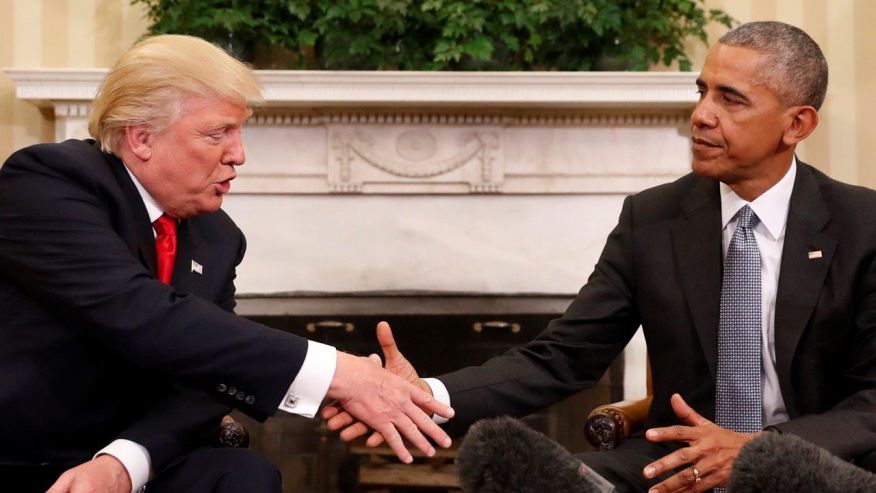
President-elect Donald Trump and sitting US President Barak Obama during the transition period (credit: shadowandact.com)
DREAM OR NIGHTMARE?
This week is historic in America. The same week that began with a Monday on which Martin Luther King Jnr. is celebrated, closes on a Friday when the first and only black president leaves the Oval office for a white one who many fear isn’t exactly colour-blind. We, my family and I, were living our dream of being international investors, a reality some white officer thought was so incredulous for a black family with an accent to live in—a “shitty story,” even in the year 2017 in “the land of the free and the home of the brave.”
As Obama gives way to Trump will Martin Luther King’s dream, “… that my four little children will one day live in a nation where they will not be judged by the color of their skin, but by the content of their character” remain a dream, become a reality or even morph into a nightmare? We watch and pray.
Why God hasn’t killed Obinim…yet!
You don’t have to be well-versed in the Bible to know this self-styled ‘Bishop’ is a false prophet; so why the heck is he allowed to operate freely and with such audacity… and for so long?
TRUE OR FALSE?
The day I got on the same flight with ‘Bishop’ Daniel Obinim, O how I prayed! Neither the huge, blazing white 4×4 he was chauffeured to the Kumasi airport in nor his skimpy suit impressed me. His obviously bleached countenance was striking yet not even that occupied my mind like this doomsday thought: “is today the day?”
In the first place, I was wondering why on earth this Founder and General Overseer of International God’s Way Church did not just turn into a bird and make the short 45-minute flight to Accra since he claims he has the ability to turn into other creatures. Apparently he can turn into a lion, dog or snake and bite people to death on spiritual visits or siphon money from people and places (banks beware!). Perhaps he hasn’t upgraded to the avian realm yet—I don’t know and I don’t care—but clearly the ‘Bishop’ needed a lift that day. But why today of all days?
LITMUS TEST
You don’t have to be well-versed in the Bible to know this ‘Bishop’ is a false prophet. Don’t let the things money or marketing can buy fool you. “The Spirit clearly says that in later times some will abandon the faith and follow deceiving spirits and things taught by demons. Such teachings come through hypocritical liars, whose consciences have been seared as with a hot iron.” (1 Timothy 4:1-2, emphasis mine)
Jesus Christ shows us the way to tell who’s true and whose not. First He warns us: “Watch out for false prophets. They come to you in sheep’s clothing, but inwardly they are ferocious wolves.” (Matthew 7:15) Then he gives us the litmus test twice in a space of five verses: “By their fruit you will recognize them. (vs. 16 and 20)
Doctrine is important in telling who’s a real ‘man of God’ and who isn’t but ultimate test is fruit—their character and consequence of their lives. Things like their speech seasoned with salt, their love, patience, goodness, faithfulness, gentleness, self-control. Let me not go into the litany of Obinim’s character issues, from slander to sex. By the way, according to him, his adultery with one of his junior pastors’ wife was meant to be a sign to his followers that he is human and not as divine as perceived by them.
Forget the miracles. Not all miracles are done by the Spirit of the Living God. Ask Moses and he’ll tell you about Jannes and Jambres, the famous magicians of Pharoah. “Aaron threw his staff down in front of Pharaoh and his officials, and it became a snake. Pharaoh then summoned wise men and sorcerers, and the Egyptian magicians also did the same things by their secret arts: Each one threw down his staff and it became a snake. But Aaron’s staff swallowed up their staffs.” (Exodus 7:10-12). Later, these same sorcerers duplicated the changing of water into blood (7:22) and the production of frogs (8:7). However, the sorcerers were powerless to duplicate the other plagues (8:19).
You may recall that God gave Pharaoh and his magicians—and indeed all of Egypt—a very long rope. They had nine opportunities (you may call them ‘plagues’) to change their minds and their ways. Eventually by the tenth they did—but only when it was rather late. So much and so many had already been destroyed.
Feeling so annoyed and vindictive that July afternoon I was wondering: is today the day God is finally going to finish off Obinim? Would he have come to the end of the rope by the end of this runway? Oh, and my prayer was not so much for him but for me—that this wasn’t the day, time or the means by which God was going to bring Daniel Obinim to book because I would end up as “collateral damage.”
THE GOD WHO IS WEAK AND SLOW
So why hasn’t God killed Obinim…yet? First, for God’s sake. I’ve learnt a cardinal lesson from searching the scriptures this year that has shocked me, to say the least. It hasn’t been so much the fact that God wants His glory to be seen among all peoples, for his fame and name to be spread to all nations and throughout all generations per se. What I’ve found shocking is what He wants most to be known for—something my judgmental and vindictive self considers rather weak and unimpressive!
In Exodus 33:18-34:8, God told Moses He would proclaim His “name” before him. Then He proceeds to list some phrases or ideas (especially Exodus 34:6-7) which reveal that for which God wants to be “famous”:
- “The compassionate and gracious God”
- “Slow to anger”
- “Abounding in love and faithfulness”
- “Maintaining love to thousands”
- “Forgiving wickedness, rebellion and sin”
- “Yet he does not leave the guilty unpunished.”
Ah! This is the very opposite of how the gods in my hometown and many other regions of the world are regarded. They are seen as powerful, hard to appease and delivering such instant justice that people who feel aggrieved would rather go and consult them than leave their ‘enemies’ to this seemingly slow and suspiciously weak God of Abraham.
In fact, these descriptive phrases of the nature of the Living God also appear later in Numbers 14:15-19, in which Moses prayed with respect—when God was really angry with the Israelites for their rebellion and grumbling regarding the Promised Land—reminding Him, so-to-speak, of how He wanted to be known among the nations.
Make no mistake, the Lord was angry, very angry. “How long will these people treat me with contempt? He said. “How long will they refuse to believe in me, in spite of all the signs I have performed among them? I will strike them down with a plague and destroy them…” (Ex. 14:11-12). Moses succeeded in assuaging God’s anger by reminding Him of His fame that Egypt and the rest of the world had heard about and challenged Him to display His strength and power. What is that strength and power? “Now may the Lord’s strength be displayed, just as you have declared: ‘The Lord is slow to anger, abounding in love and forgiving sin and rebellion. Yet he does not leave the guilty unpunished; he punishes the children for the sin of the parents to the third and fourth generation.’ In accordance with your great love, forgive the sin of these people…” (Numbers 14:18-19, NIV). God relented; God forgave; Moses succeeded.
TO GIVE OR NOT TO GIVE?
So why hasn’t God killed Daniel Obinim…yet? Secondly, for Obinim’s sake. God gives a long rope, a very long rope, but not forever. Contrary to what many think of God as never giving up, God does give up and give over (Romans 1:24,26, 28; Acts 7:42; Psalm 81:12) but He is very, very, very, so very patient with us. “The Lord is not slow in keeping his promise, as some understand slowness. Instead he is patient with you, not wanting anyone to perish, but everyone to come to repentance.” (2 Peter 3:9) And when we finally give in, when we say we have done a 180, there must be fruit to show—proof by the way we live that we have truly repented of our ways and turned to God.
BEAUTY AND THE BASTARD
Two weekends ago I got off the phone with a cocktail of emotions, mainly deep anger. No, not at the suicidal university graduate full of potential yet now struggling to keep her own body and soul together plus that of her new-born bastard but at the so-called pastor, supposedly married, who put her in that situation.
I did not even realize September 10, the day we spoke on phone, was world anti-suicide day; but that lady had just narrowly escaped suicide the night before by chancing upon one of my blogs. She decided to hold off, hold on and gathered the courage to give me a call.
Self-styled pastors, prophets and bishops like Obinim who apparently are accountable to no one and do whatever they like ‘in the name of the LORD’ seem to get away with it…for now. Now you know why.
Before the flight would land, this beautiful, fair-coloured lady sitting directly behind Obinim and his aide-de-camp reaches out to the latter and asks for the ‘Bishop’s’ number. From where I sit I can see the grin on Obinim’s face as he nods in approval for the contact to be given. Business is booming, judgment can wait; here comes another victim.
It struck me to the core when someone made a very poignant quote: “when others are in the wrong we demand justice but when we are wrong we seek mercy.” How profoundly true! Now you know why God hasn’t killed Obinim…yet—it’s the same reason He hasn’t finished off you and me.

